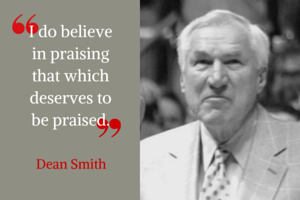The Finger-Pointing Power of Dean Smith
By ASLAN Training
March 9, 2016
3 min read
The ASLAN Other-Centered® Leader
Coaches Quiz Blog Series
 Every winner has a coach, and every coach has a philosophy. Here is a deeper look inside the philosophy of one of today's best.
Every winner has a coach, and every coach has a philosophy. Here is a deeper look inside the philosophy of one of today's best.
Dean Smith was head coach of the UNC Chapel Hill men's basketball team for 36 years, from 1961 to 1997. His 879 wins were the most in NCAA history at the time of his retirement. Coach Smith was known as a moral coach whose players had high graduation rates and who ran clean programs, as well as bringing in desegregation to both his team and the town of Chapel Hill early in his coaching career.
One of the things Smith taught his players to do early on was to point their finger at the assisting passer when they made a basket. This gesture was meant to reinforce the idea of teamwork and to acknowledge the assisting passer for being selfless in passing the ball rather than trying to shoot every time, as some players would do.
This intense focus on teamwork had its roots far back in Smith's coaching career. He used to tell the story of coaching a player at Air Force who shot every time he had the ball, never passed. Smith pulled his four teammates off the court and told the player, "Okay, play them by yourself."
"Who takes the ball out of bounds, sir?" the player asked.
"Good," Smith told him. "Now you've learned that you need two, anyway."
Good sales coaches know that teamwork is an important part of any sales force. It's all too easy to get focused on meeting quotas and personal goals, but there is an element of coaching and teamwork to any sales endeavor in this age of increasing collaboration and idea sharing. Whether it's sharing successful techniques so that the team can benefit, or committing to give the new sales training program your full effort, encouraging the kind of positive finger-pointing Smith taught can move the whole team forward.
This excerpt from the ASLAN Training & Development paper "6 Pitfalls of a Sales Training Program," explains the importance of getting everyone on board and working together as a team to address sales gaps and grow as a team.
Pitfall 2 - Investing More in What Happens IN the Workshop than AFTER the Workshop
Everyone understands that training is a process and not an event - it's almost cliché. But because most either don't understand the process or lack the buy-in to implement the process, the truth doesn't get applied. So what is the process? What do most organizations miss in creating their sustainment plan? They lack a plan to ensure that managers are equipped to drive change - a process that holds sales leaders accountable to develop the competency to lead and coach and the discipline to follow the process. At ASLAN, we address this through certification.
Manager Certification
Significant change happens one-to-one, not in a workshop. Therefore MORE investment is required in developing front line managers than in developing reps but all too often the reverse is true. To ensure managers are equipped to drive change, a certification process should be created that holds managers accountable to:
1. Understand the terms and language of the program. They may understand the concepts but if they fail to use the exact terminology, confusion sets in and reinforcement is lost.
2. Role-model the core competencies. It's not enough that they understand the terms, they must be able to role-model the basic skills and strategies taught in the program.
3. Accurately diagnose the root cause of the performance gap and prescribe the most effective development plan to bridge the gap.
4. Consistently coach their reps - not just talk to their reps about performance or provide tips about how to improve - but coach - observing rep's performance in the field or on the phone. This is THE biggest barrier in sustaining a sales training initiative. If managers don't free up the bandwidth to consistently observe a rep on a call and create a development plan, training becomes little more than a motivational session, with a few additional tips added to the rep's bag of tricks.
What About the Reps?
Similar to the manager, reps need accountability to kick start the learning. If the program was successful, participants will leave the classroom with a strong desire to apply what they learned - but change is hard and they need a boost to get over the hump. The key is to break the program down into a 90 day, self-development plan - focusing on one major concept at a time. Very shortly after the workshop, ask the reps for a commitment to the plan. Then create a mechanism for reporting their progress to both the rep and management.
Two essential ingredients for any successful sales organization are teamwork and coaching. For Coach Smith, success as a coach came when he was able to teach the value of working as a team. Will you take the time as a sales manager and commit to improving your team?
Contact us with questions about your sales training programs and how ASLAN can help.
Unlock Your Team's Full Sales Potential
Questions? Watch our CEO, Tom Stanfill, address our frequently asked questions below.

